Courses in Yoga, Self-care and Spirituality
Self-paced
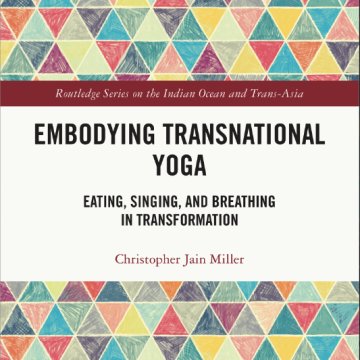
3006 | Embodying Transnational Yoga
Added to cart
3006 | Embodying Transnational Yoga
"Yoga is more than āsana" is a phrase we commonly hear in the contemporary yoga world. But what does this actually mean in practice? In this course we will explore the ways yoga practitioners engage in the practice of eating, singing, and breathing. We will learn about these three transformative, yet understudied embodied yoga practices: yogic diet, music, and breathing techniques. While embracing philosophical, philological, and historical approaches to the study of these practices, this course also presents novel cultural approaches for understanding each following the methodology in Professor Miller’s book, Embodying Transnational Yoga: Eating, Singing, and Breathing in Transformation. Students will move through three contemporary sites of yogic practice where they will learn about the social-historical and cultural forces that both shape and enable particular ways of yogic eating, singing, and breathing therein. By combining the field of yoga studies with Indian Ocean Studies, Food Studies, Ethnomusicology, and Pollution Studies, they will learn that when they embody their own yoga traditions’ transformative practices, they are also simultaneously embodying other unseen cultural and social-historical influences. Students will therefore also learn how to perform research in their own yoga tradition or community to better understand and communicate to others the often unrecognized and complex histories, social contexts, and philosophies comprising their embodied yoga practices. Professor Miller will take students through a systematic approach for performing yoga research to help each participant identify their own key research questions concerning their yoga tradition’s embodied practices and techniques. They will also be inspired to develop their own research methods that will help them to answer these critical questions, thereby becoming a scholar of their own yoga tradition. The only prerequisite for this course is a sincere curiosity to learn about the historical sources and cultural influences shaping contemporary yoga practices whether they are eating, singing, breathing, or another transformative yogic technique of special interest. This course is offered in collaboration with Yogic Studies
Instructor
Self-paced
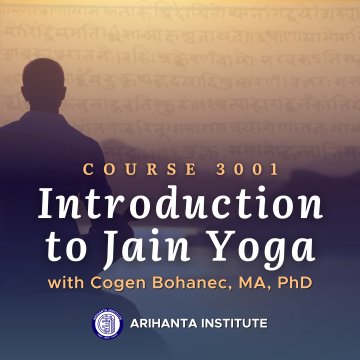
3001 | Introduction to Jain Yoga
Added to cart
3001 | Introduction to Jain Yoga
Unpack the ancient and venerable textual tradition of Jain yoga. Explore the theory behind the psychology and contemplative states of Jain yoga. Study the vocabulary and conceptual frameworks of the Jain yoga tradition.
$99.00 USD
Instructor
Self-paced
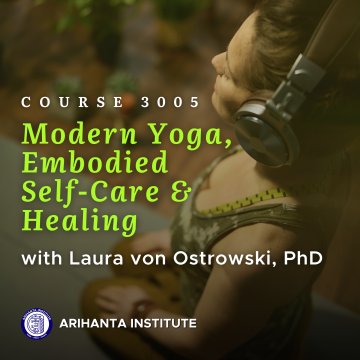
3005 | Modern Yoga, Embodied Self-Care and Healing
Added to cart
3005 | Modern Yoga, Embodied Self-Care and Healing
This course builds on the understanding of modern yoga as a set of historically evolved body-mind practices and discourses that developed into an effective, late-modern self-care. Based on this definition, contemporary yoga – inspired by both pre-modern practices, such as āsana and prāṇāyāma as well as more modern practices, such as mindfulness, body awareness or relaxation techniques – can be defined as a highly efficient tool for self-care. It continues to evolve by adapting to contemporary needs and contributes to the health of late modern societies.In 1946, the World Health Organization defined “health” as complete physical, mental, and social wellbeing. Thus, cultural studies can and have to contribute to such a holistic understanding of health with their view on humans as biological, but likewise social, ritual, symbolic and deeply interconnected beings, very much so via their bodies.But how can this insight be brought into practice? The course examines theories on embodiment and body knowledge and enriches our existing, individual yoga practice with additional, accessible, and highly efficient tools for self-care. It helps developing a more elaborate and sophisticated language as well as a deepened understanding for embodied processes. This includes the knowledge and training of our external and internal senses, getting to know our individual body image and understanding that how we talk to ourselves matters. We investigate the body scheme, understand the importance of touch, flow-states, relaxation, and other techniques that we can employ for both, getting to know but also to transcend ourselves as well as to understand ourselves as fully interconnected beings. Knowing one’s own body in such elaborate ways can, in a yogic manner, help to unlearn embodied habits and conditioning and to gain distance from them whenever needed.
$99.00 USD
Instructor
Self-paced
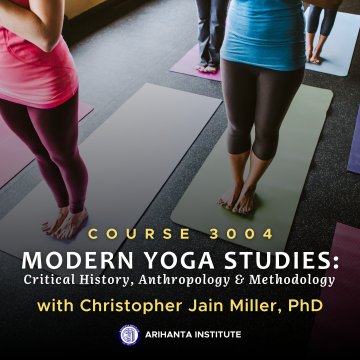
3004 | Modern Yoga Studies: Critical History, Anthropology and Methodology
One of the primary questions students of modern yoga seek to answer is precisely how the forms of contemporary yoga practiced today are connected to pre-modern forms of yoga developed in India. To begin to answer this question and to formulate new questions, this course will trace some of the historical continuities and discontinuities between pre-modern and modern yoga practices, demonstrating that modern yoga is a complicated, transnational cultural product. We will explore the legacy of the first yoga teachers who brought yoga to America and Europe as well as yoga’s development from a historical, social, and political perspective.Students will thus take into account current scholarly debates regarding the relationship of transnational yoga to categories such as capitalism, neoliberalism, orientalism, racism, speciesism, gender, cultural appropriation, biopolitics, nationalism, and colonization. Doing so will encourage yoga practitioners to adopt new methodologies concerning the critical study of modern yoga, and will also give them an opportunity to confront and unravel saṃskāras, or acquired mental impressions and social conditionings, related to their inherited beliefs regarding the origins, history, and contemporary practice of yoga. The course is thus simultaneously intellectual as well as, from a yogic perspective, transformational.
$99.00 USD
Instructor
Self-paced
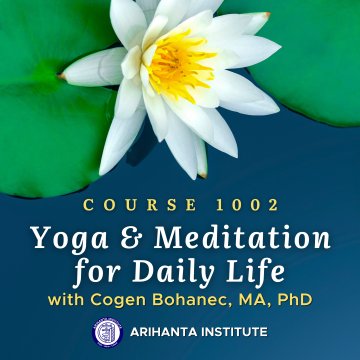
1002 | Yoga and Meditation for Daily Life – Stress Management
This class seeks to bring the conceptual framework of the textual tradition of Jain Yoga to life by engaging in contemplative practices that have been practiced since ancient times across Dharma Traditions.
$99.00 USD
Instructor
Self-paced
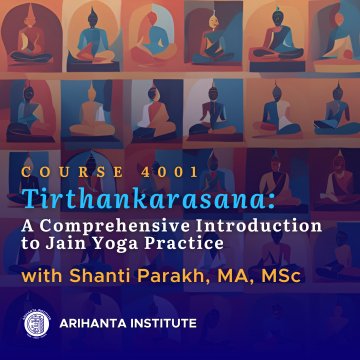
4001 | Tirthankarasana: A Comprehensive Introduction to Jain Yoga Practice
The goal of Jain yoga and meditation is to make progress towards liberation. The purpose of this course is to learn the proper practice of āsanas (poses) related to each of the 24 Tīrthaṅkāras, integrated with related mantras. Each class will consist of yogāsanas, mantras, prāṇāyāma, and dhyāna along with related theory. By dedicated practice of these limbs of yoga, we honour the Tīrthaṅkāras and are continuously inspired by their example.Jain yoga can be practiced by Jains of all sects, as well as by non-Jains. Students will start to understand the true potential of the soul by understanding how the practice of Jain yoga can help shed karma, prevent the influx of new karma, and allow an individual to progress in spiritual development. This is a course of learning and doing. Theoretical background will be provided, but you will be expected to practice what is being taught to the best of your ability.
$99.00 USD
Instructor
Self-paced
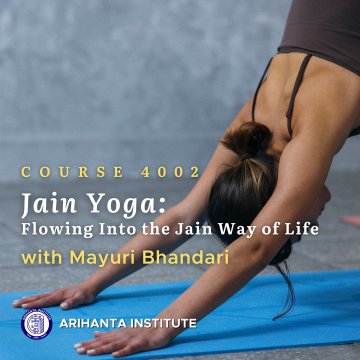
4002 | Jain Yoga: Flowing into the Jain Way of Life (for NextGen)
Modern Yoga in the Western space tends to be more postural based, often limited to the mat in a studio setting. In this class, you will dive deeper using Asana, Pranayama, & Meditation techniques through a Jain lens- with an emphasis on applying Jain ethics/concepts in your physical practice [internally & externally] and in life. This Vinyasa flow based class will also focus on mental, emotional, & spiritual growth. Class discussion will follow to integrate these concepts. This class is open for all levels, and instruction is in English.
$99.00 USD
Instructor
Self-paced
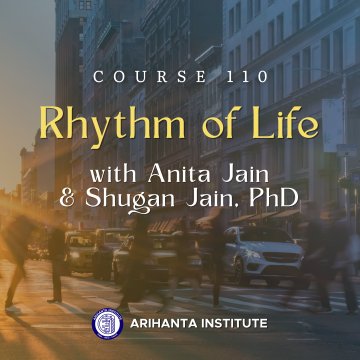
110 | Rhythm of Life
Added to cart
110 | Rhythm of Life
Take a journey within, to understand better your values, beliefs and desires. Everything in the universe has a rhythm, the sun rises and sets, the phases of the moon, the ebb and flow of tides, the changing of seasons, similarly human life has ups and downs, delight and despair, love and loneliness, health and disease, abundance and lack and so on. But we forget this and at times we feel stuck in our suffering, or we question our own self-worth, we feel lost, disconnected with our inner resources and guidance and life starts feeling like it has gotten off course. The Rhythm of Life program offers you a space to reflect, learn and discover your own rhythm and take charge in your life to experience greater fulfilment, connection, healing, restoration, and harmony in life.The program is based on the Jain principle “Jina- Be a Conqueror of the self” applied to a householder lifestyle. With better understanding of our true self, we can evolve, overcome ourobstacles and limiting beliefs, and take charge of our overall well-being and happiness. There are 4 main modules in this course, which bring together various Indian philosophical traditions with a special emphasis on Jain philosophy, modern scientific research, and real life experiences.Learning Objectives:1. Develop a toolkit to lead a happier and holistic life.2. Understand human suffering and its purpose in our lives.3. Become more conscious of values-based living.4. Redesign beliefs to harmonize your inner and outer worlds.5. Create new habits to become the best version of yourself.
$99.00 USD
Instructors
Self-paced
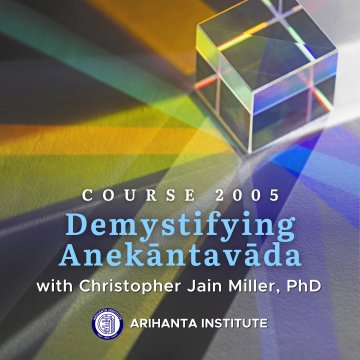
2005 | Demystifying Anekāntavāda
Added to cart
2005 | Demystifying Anekāntavāda
Explore the history, philosophies, and many meanings of the popular Jain concept known as “anekāntavāda”. Begin by exploring anekāntavāda’s rich history and understand why this term means much more than just “intellectual ahiṃsā”. Next, appreciate the philosophical complexity of anekāntavāda and its variant applications through nayavāda, syādvāda, saptabhaṅgī, and nikṣepa.Finally, with this philosophy and history in mind, bring your fresh and deeper understanding of anekāntavāda into the present and apply it to one of many important questions of contemporary society.
$99.00 USD
Instructor
Self-paced
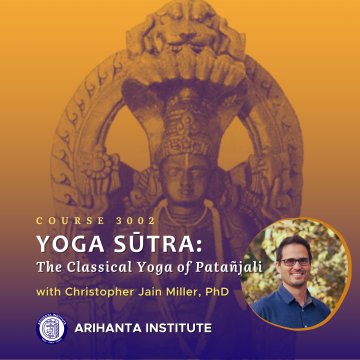
3002 | Yoga Sūtra: The Classical Yoga of Patañjali
Added to cart
3002 | Yoga Sūtra: The Classical Yoga of Patañjali
Master the philosophy, goals, & practices of Patañjali’s Yoga Sūtra & identify its Jain, Buddhist, & Vedic influences. Understand the history that allowed this text to become a text in the modern yoga canon. Learning Objectives• Learn the classical yoga of Patañjali’s Yoga Sūtra and Vyāsa’s Bhāṣya• Take time to reflect on and incorporate Patañjali’s principles into daily life• Learn the text's Sanskrit vocabulary in depth to penetrate its deeper meaning• Understand the Yoga Sūtra’s ancient as well as modern colonial history
$99.00 USD
Instructor
Graduate Course
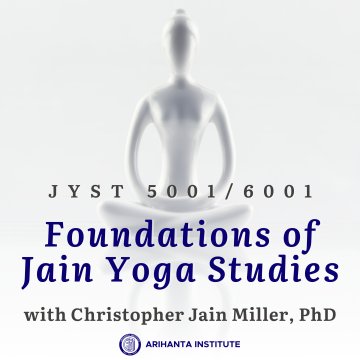
Foundations of Jain Yoga Studies
Added to cart
Foundations of Jain Yoga Studies
Foundations of Jain Yoga Studies provides students with the historical and philosophical foundations for engaging in the study of Jain yoga. Students will learn about the history of yoga broadly, while also learning core methodologies used to study yoga in the field of Yoga Studies. With this new knowledge and skillset, students will learn how to study Jain yoga and see how it emerged in engagement with other yoga traditions since ancient times and into the present.
Instructor
Graduate Course
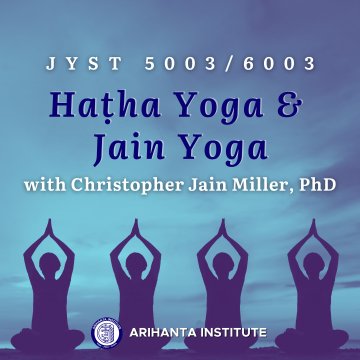
Haṭha Yoga and Jain Yoga
Added to cart
Haṭha Yoga and Jain Yoga
The “Haṭha Yoga and Jain Yoga” course carefully considers the development of the haṭha yoga tradition, the medieval forms of yoga that emerged after India’s classical period, and which are the predecessors of today’s forms of physical yoga. Students are offered the opportunity to undertake the postural, breathing, and meditation techniques found in medieval haṭha yoga texts as well as to see how these texts influenced, or were perhaps influenced by, the Jain yoga tradition in particular.
Instructor
Graduate Course
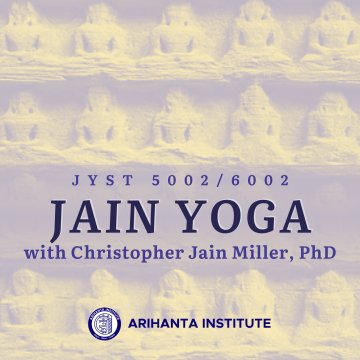
Jain Yoga
Added to cart
Jain Yoga
Jain Yoga considers Jain yoga from ancient sources to the present. We will study secondary scholarship analyzing Jain yoga from critical perspectives, while reading translations from Sanskrit and Prakrit primary sources describing Jain yoga. Students will also practice and reflect on their experience of various forms of Jain yoga and meditation, experimenting with what it means to embody Jain yoga principles and techniques in their everyday lives in contemporary society. No prior experience is necessary.
Instructor
Graduate Course
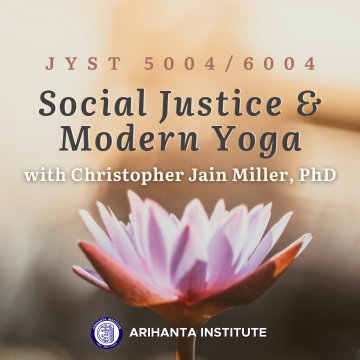
Social Justice and Modern Yoga
Added to cart
Social Justice and Modern Yoga
Social Justice and Modern Yoga surveys the history and contemporary practice of modern yoga and its intersection with issues of social justice. Students will encounter both the major names and lineages in the history of transnational modern yoga as well as some of the lesser-known figures who have contributed to the development of transnational yoga into the present. The course is structured both historically and thematically, presenting topics including, but not limited to, yoga’s intersections with warrior asceticism, colonization, non-violent social justice movements, nationalism, Orientalism, the carceral system, racism, White supremacy, appropriation, gender, foodways, speciesism, pollution, necropolitics, biopolitics, neoliberal capitalism, and abuse. Students will be trained in the basic methods of writing yoga ethnography and social history and will complete an ethnographic research project on a topic of their choice related to the academic field of Modern Yoga Studies.
Instructor
Self-paced
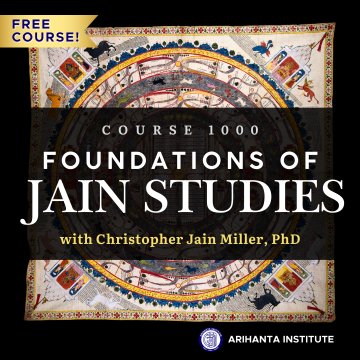
1000 | Foundations of Jain Studies
Added to cart
1000 | Foundations of Jain Studies
This course offers an introduction to Jain Studies. Begin with an exploration of key Jain teachings and practices, focusing on the principles of non-harming (ahiṃsā) and non-possession (aparigraha), both central to the tradition. Delve, then, into the Three Jewels of Jainism—right worldview, right knowledge, and right conduct—and examine how these principles shape the foundation of the Jain tradition. Next, investigate the profound connection between Jainism and animal advocacy, exploring the teachings of Mahavira on animals as well as contemporary Jain practices of animal care. Afterwards, explore the Jain perspective on the human body, including the importance of health, the role of karmas in shaping one’s embodiment, and the fine line between bodily renunciation and the need to have good health. Finally, observe how Jainism’s commitment to compassion and social justice is expressed through transformative social initiatives, focusing on the work of Acharya Chandanaji and the global reach of her charitable organization, Veerayatan. This is designed as a one-week course that will take approximately 3 hours to complete, and includes a series of 14 lectures with accompanying readings and a final quiz to guide you through essential foundations in Jain Studies. Learning Objectives:Understand the core principles of Jainism, including the practices of non-harming (ahiṃsā) and non-possession (aparigraha)Analyze the Three Jewels of Jainism (right worldview, right knowledge, and right conduct)Evaluate the relationship between Jainism and animal advocacyLearn the Jain perspective on the human body and its role in spiritual practiceAssess the role of compassion and social justice in Jainism
Free
Instructor
Self-paced
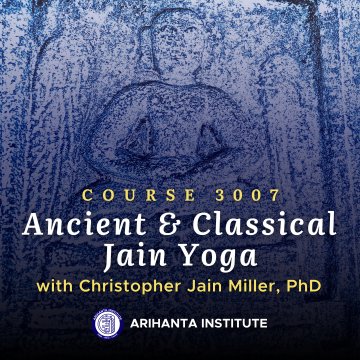
3007 | Ancient and Classical Jain Yoga
Added to cart
3007 | Ancient and Classical Jain Yoga
This course provides an in-depth exploration of yoga and meditation as understood within ancient and classical Jain scriptures. In Part 1: Ancient Jain Yoga, students will be introduced to foundational concepts such as āsana, or physical postures, as a tool for purification and meditation. Drawing from early Jain texts, including the Uttarādhyayanasūtra and the Daśavaikālikasūtra, students will learn how restraint of the body, mind, and speech formed early Jain definitions of yoga. Part 2: Yoga and Meditation in Classical Jain Philosophy, transitions into an examination of the Tattvārthsūtra and its commentaries, where yoga is described as the inflow (āsrava) of karma—representing an obstacle to spiritual liberation. Students will explore the key to liberation through correct worldview, knowledge, and conduct, as well as the role of dhyāna (meditation) as both an austerity (tapas) and a means of wearing away (nirjarā) karma. Through a discussion of virtuous (dharma) and pure (śukla) meditation, the course will highlight how advanced meditation practices lead to spiritual purification and the elimination of karma, providing a comprehensive understanding of Jain yoga's ultimate aim of mokṣa, or liberation. This is designed as a two-week course that will take approximately 4 hours to complete, and includes readings and a series of 10 lectures to guide you through the intricacies of ancient and classical Jain definitions of Yoga. Learning Objectives:Learn the role of āsana (physical postures) in ancient Jain yoga as a tool for purification and meditation.Discover how restraint of body, mind, and speech formed early Jain definitions of yoga, with guidance from key ancient texts.Explore the classical Jain philosophical view of yoga as the inflow (āsrava) of karma, and see how this concept is discussed in the Tattvārthsūtra and its commentaries.Understand how meditation (dhyāna) serves as an austerity (tapas) to wear away karma (nirjarā) and how virtuous (dharma) and pure (śukla) meditation practices lead to spiritual purification and liberation (mokṣa).
$99.00 USD
Instructor
Self-paced
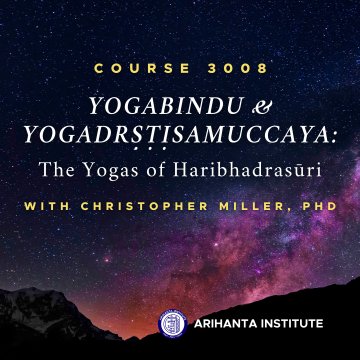
3008 | Yogabindu & Yogadṛṣṭisamuccaya: The Yogas of Haribhadrasūri
This course offers a close exploration of the teachings and historical contexts of two significant teachers of early Śvetāmbara Jain yoga: Haribhadra Virahāṇka and Haribhadra Yākinīputra.Beginning with an introduction to Haribhadra Virahāṇka’s (ca. 6 th c. CE) hagiography, we will examine how his legendary name reflects the Jain path to liberation (mokṣa), setting the stage for a study of his yoga texts aimed for the same goal: the Yogabindu and Yogaśataka. In addition to looking at the limited historical evidence regarding Haribhadra Virahāṇka’s tentative 6 th c. CE dating, the course will analyze Haribhadra’s categorization of yoga practitioners into three levels, with a focus on the cāritrin (pathgoer), who embodies the path of comprehensive Jain yoga practice. Through a detailed examination of the five types of yoga in the Yogabindu, students will understand how these practices facilitate liberation according to Jain karma theory. Students will also appreciate how the Yogabindu represents Jainism’s first-known exposition of “yoga” as a spiritual path, rather than something that causes the inflow of karma as understood in the preceding classical period.Transitioning to Haribhadra Yākinīputra (ca. 8 th c. CE), the course will delve into his hagiography as well as his distinct contributions to Jain yoga, the Yogadṛṣṭisamuccaya and Yogaviṁśikā. We will investigate how Haribhadra Yākinīputra is historically (and tentatively) dated to the 8 th c. CE, while also appreciating how he both integrates but also simultanesouly critiques various traditions such as tantra, Buddhism, and Brahmanism within his Jain framework. Finally, students will understand how Haribhadra maps his yoga philosophy onto not only Patañjali’s 8-limbed yoga but also Jain concepts including the 14 guṇasthānas. Students will appreciate how the two Haribhadras put their respective Jain teachings into dialogue with other religious and philosophical traditions, while maintaining a commitment to their own Jain tradition.This is designed as a two-week course that will take approximately 4 hours to complete, and includes readings and a series of 10 lectures to guide you through the intricacies of the yogas of Haribhadra Virahāṇka and Haribhadra Yākinīputra. It is recommended, though not required, that students complete course 3007 “Ancient and Classical Jain Yoga” before taking this course if they wish to have further background on Jain yoga. Learning Objectives:1. Learn the histories and hagiographies of Haribhadra Virahāṇka and Haribhadra Yākinīputra to understand how their legendary names were created.2. Understand Haribhadra Virahāṇka’s categorization of yoga practitioners, focusing on the cāritrin and the five types of yoga practices in the Yogabindu, to grasp their role in facilitating liberation through Jain karma theory.3. Learn the contributions of Haribhadra Yākinīputra to Jain yoga, especially hisYogadṛṣṭisamuccaya, and how he critiques and integrates various traditions such as tantra, Buddhism, and Brahmanism within his yoga framework.
$99.00 USD
Instructor
Upcoming
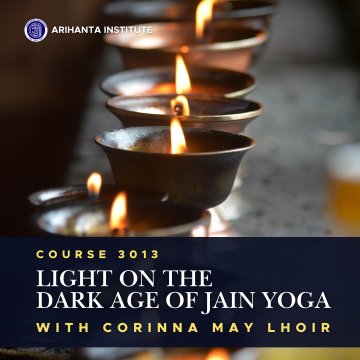
3013 | Light on the Dark Age of Jain Yoga
Added to cart
3013 | Light on the Dark Age of Jain Yoga
This course from the Center for the Study of Jain Yoga, explores Jain Yoga from the 11th to the 17th century CE, often considered the "Dark Age" for Jain Yoga. We will investigate the evolution of Jain Yoga, its interaction with other Indian spiritual traditions, particularly Hatha Yoga and the Bhakti movement, and its role in shaping broader yogic traditions. The course will also examine key texts, including the Yogapradīpa and the Yoga Battīsī, and their commentaries, focusing on how Jain scholars integrated physical, spiritual, and devotional practices into their teachings. Learning Objectives:• Understand the evolution of Jain Yoga during the medieval period and its relationship with other Indian traditions.• Analyze the influence of Hatha Yoga and the Bhakti movement on Jain Yoga practices.• Study the Yogapradīpa and Yoga Battīsī as central texts and explore their impact on Jain spiritual practices.• Engage with Jain Yoga's approach to atma-paramatma (individual and universal consciousness), and meditation.
 Available starting May 5, 2025 + Live Zoom Q&A sessions on May 9, 16, 23, and 30 at 8-9AM PDT.
Available starting May 5, 2025 + Live Zoom Q&A sessions on May 9, 16, 23, and 30 at 8-9AM PDT.
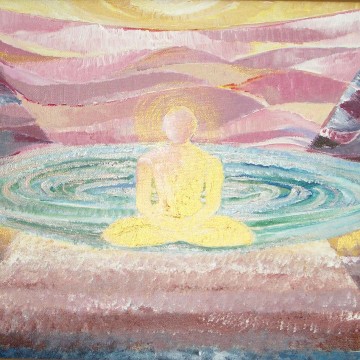


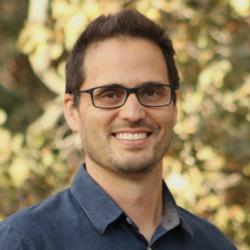 Christopher Miller, PhD
Christopher Miller, PhD Cogen Bohanec, MA, PhD
Cogen Bohanec, MA, PhD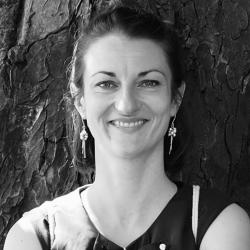 Laura von Ostrowski, PhD
Laura von Ostrowski, PhD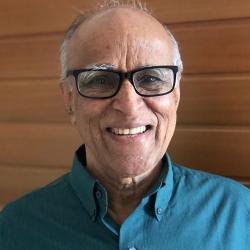 Shanti Parakh
Shanti Parakh Mayuri Bhandari
Mayuri Bhandari Shugan Jain
Shugan Jain Anita Jain
Anita Jain Corinna May Lhoir
Corinna May Lhoir